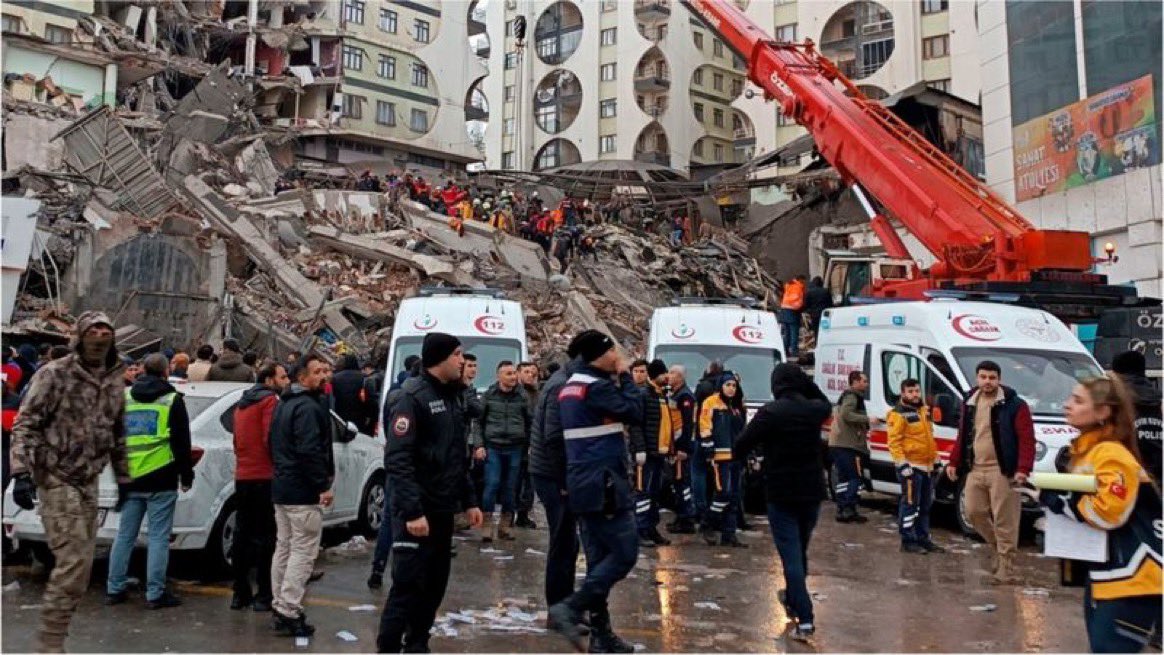Turkish President Recep Tayyip Erdogan has said that the death toll in Turkey due to last week’s earthquake has increased to 35,418.
The United States Geological Survey (USGS) recorded another earthquake in the Turkey region on Sunday. The USGS informed that it was a 4.7 magnitude earthquake that occurred 24 km South of South-East (SSE) of Kahramanmaraş, Turkey.
The USGS further informed that this latest earthquake, in a series of quakes that has reduced many cities of the country to rubbles, took place at a depth of 15.7 km. The agency also informed that the earthquake occurred at 00:03:15 (UTC+05:30), Reuters reported.
Meanwhile, rescuers in Turkey had informed that the death toll in the country from repeated concurrent earthquakes have risen to 33,000, as hopes of recovering all under the rubbles reduce everyday.
The earthquake that shattered Turkey, the earthquake that measured above 7 on Richter scale, was the deadliest quake in Turkey since 1939.
Turkish authorities sought to maintain order across the disaster zone and began legal action over building collapses.
In a central district of one of the worst hit cities, Antakya in southern Turkey, business owners emptied their shops on Sunday to prevent merchandise from being stolen by looters.
Residents and aid workers who came from other cities cited worsening security conditions, with widespread accounts of businesses and collapsed homes being robbed.
Facing questions over his response to the earthquake as he prepares for a national election that is expected to be the toughest of his two decades in power, President Tayyip Erdogan has said the government will deal firmly with looters.
In Syria, the disaster hit hardest in the rebel-held northwest, leaving homeless yet again many people who had already been displaced several times by a decade-old civil war. The region has received little aid compared to government-held areas.
"We have so far failed the people in north-west Syria," United Nations aid chief Martin Griffiths tweeted from the Turkey-Syria border, where only a single crossing is open for UN aid supplies.
"They rightly feel abandoned," Griffiths said, adding that he was focused on addressing that swiftly.
More than eight days after the first quake struck, emergency workers still found a handful of people clinging to life in the wreckage of homes that had become tombs for many thousands.
A team of Chinese rescuers and Turkish firefighters saved 54-year-old Syrian Malik Milandi after he survived 156 hours in the rubble in Antakya.
On the main road into the city the few buildings left standing had large cracks or caved-in facades. Traffic occasionally halted as rescuers called for silence to detect signs of remaining life under the ruins.
A father and daughter, a toddler and a 10-year-old girl were among other survivors pulled from the ruins of collapsed buildings Sunday, but such scenes were becoming rare as the number of dead climbed relentlessly.
At a funeral near Reyhanli, veiled women wailed and beat their chests as bodies were unloaded from lorries – some in closed wood coffins, others in uncovered coffins, and still others just wrapped in blankets.
Some residents sought to retrieve what they could from the destruction.
In Elbistan, epicentre of an aftershock almost as powerful as Monday's initial 7.8 magnitude quake, 32-year-old mobile shop owner Mustafa Bahcivan said he had come into town almost daily since then. On Sunday he sifted through the rubble searching for any of his phones that might be still be intact and sellable.
"This used to be one of the busiest streets. Now it's completely gone," he said.



